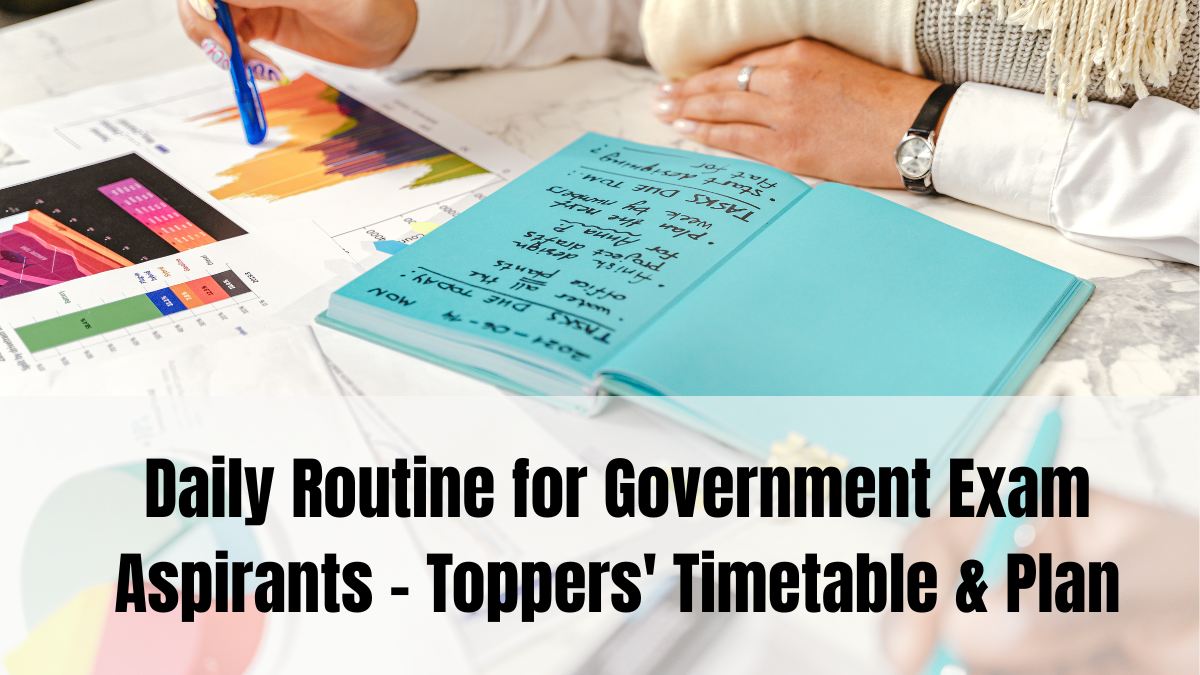When it comes to cracking competitive exams like UPSC, SSC, Banking, Railways, or State PSCs, what truly sets toppers apart is their discipline and daily routine. With the syllabus growing each year and competition getting stiffer, it’s no longer enough to study randomly. A well-planned daily routine for govt aspirants is what converts effort into selection.
This article breaks down how toppers manage their time, balance subjects, revise efficiently, and avoid burnout while preparing for government exams.

Table of Contents
Why a Consistent Daily Routine Matters

A structured timetable gives clarity, consistency, and long-term focus. It helps aspirants:
-
Cover the entire syllabus without panic
-
Develop a productive daily habit
-
Maintain energy levels throughout the day
-
Ensure enough time for revision, mocks, and current affairs
-
Avoid mental fatigue and distractions
The daily routine for govt aspirants is not about how many hours you study—it’s about how well you use each hour.
Sample Toppers’ Daily Timetable for 2025 Exams
Here’s a practical routine many successful aspirants use. You can modify it based on your working hours, college schedule, or study speed.
| Time | Task |
|---|---|
| 5:30 AM – 6:00 AM | Wake up + Light stretching/meditation |
| 6:00 AM – 7:00 AM | Current Affairs reading (newspaper + notes) |
| 7:00 AM – 9:00 AM | Subject 1 (e.g. Quant, Polity) – Deep study |
| 9:00 AM – 10:00 AM | Breakfast + break |
| 10:00 AM – 12:00 PM | Subject 2 (e.g. History, Reasoning) – Concept clarity |
| 12:00 PM – 1:00 PM | Short revision + MCQ practice |
| 1:00 PM – 2:00 PM | Lunch + rest |
| 2:00 PM – 4:00 PM | Subject 3 (e.g. English, Economy) – Notes making |
| 4:00 PM – 5:00 PM | Break + Walk + Refresh |
| 5:00 PM – 6:00 PM | Mock test (sectional/full) |
| 6:00 PM – 7:00 PM | Analyze mock test + error log |
| 7:00 PM – 8:00 PM | Dinner + light conversation |
| 8:00 PM – 9:30 PM | GS/Current Affairs revision + One subject recap |
| 9:30 PM – 10:00 PM | Planning next day + Sleep prep |
If you’re a working aspirant or studying part-time, try breaking this into 3–4 focused blocks per day.
Key Elements of a Productive Daily Routine
To make your daily routine for govt aspirants successful, include these:
-
Current Affairs (Daily) – 1 hour for newspapers or monthly PDF
-
GS Subjects – History, Polity, Geography, etc. (2–3 hours/day)
-
Quant + Reasoning – Daily practice to improve speed
-
English – Reading editorials, grammar, comprehension
-
Mock Tests – 3–4 per week, with review
-
Revision – Weekly revision slots to retain old topics
-
Breaks – Short and frequent to avoid burnout
-
Sleep – 6–8 hours for memory and focus
Use Pomodoro timers (25 mins focus + 5 min break) if you struggle with long sessions.
Tips from Toppers to Stay Consistent
The difference between average and top scorers often lies in their habits. Here’s what toppers recommend:
-
Study tough subjects in the morning when your brain is fresh
-
Keep Sunday as revision + mock day
-
Make a weekly goal sheet and tick completed topics
-
Use sticky notes, trackers, or digital planners (Notion, Google Calendar)
-
Avoid social media distractions during study blocks
-
Focus on understanding concepts, not just finishing books
-
Treat each day like an exam day — disciplined and focused
Remember, small efforts every day build huge success over time.
FAQs
How many hours should a government exam aspirant study daily?
Ideally, 6–8 focused hours per day are sufficient. What matters more is how effectively you use your time, not just the total number of hours.
Should I follow a fixed routine or keep it flexible?
Start with a fixed routine to build discipline. Later, you can adjust it based on your strengths, weak areas, and energy levels.
How can I manage study with a full-time job or college?
Break your day into early morning and evening blocks. Use weekends for mock tests and revision. Even 3–4 focused hours a day can work if consistent.
How often should I take mock tests?
Take 1 full-length mock test every 3–4 days, and analyze it the same day. Daily sectional tests for Quant, Reasoning, and English are also helpful.
Is sleep important during exam preparation?
Absolutely. Lack of sleep affects memory, focus, and energy. Try to sleep 6.5 to 8 hours daily for long-term productivity.
Click here to know more.






